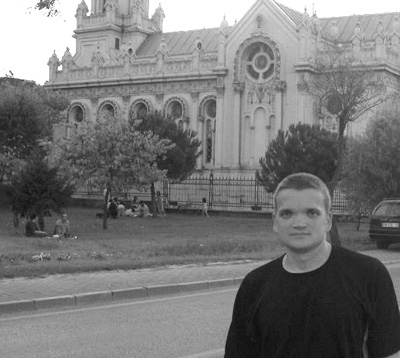DO-IT Ambassadors Assist in DO-IT Japan's First Summer Study!

Konnichiwa (hello) everyone! We spent ten days in Tokyo to assist with DO-IT Japan's first Summer Study program. It was Chris' first time in Japan, but Stuart was lucky enough to visit Japan three years ago and jumped at the chance to return. The city is huge! It was hot and humid, and there were people everywhere. DO-IT Japan is similar to DO-IT Summer Study in Seattle, but, in some respects, it was quite different. Twelve Scholars with a variety of disabilities attended DO-IT Japan. Many of the Scholars had aides who were students of the professors that were coordinating the program. Parents could have acted as aides, but the Scholars were provided with student assistants (with the exception of one medically fragile Scholar) so they could be independent and learn to direct their own care, a basic goal of both DO-IT Japan and DO-IT Washington.
We shared our experiences transitioning from high school to college. We covered things we learned from DO-IT and our personal experience. Stuart talked about the accessibility in various countries that he has visited. Many of the Scholars knew quite a bit of English, but we also had our presentations translated into Japanese by Dr. Mamoru Iwabuchi, the director of DO-IT Japan. The students asked similar questions to those we have heard from DO-IT Summer Study Scholars in Seattle. Later, Dr. Iwabuchi told us that after our talk, one of the Scholars became more interested in traveling abroad and learning English. This was cool because we think everybody should get the chance to visit another country and experience a different culture.
Questions Scholars asked us included, "Are you or have you ever been afraid to ask for accommodations? Do you fear that you will be looked down upon or see it [asking for accommodations] as admitting a weakness?" In Japan, students told us they were expected to ask for as little help as possible. Asking for too much assistance can be seen as a burden to other people. Because of this, one challenge for the Japanese Scholars is to figure out how to most effectively ask for accommodations when they go to college—a difficult challenge to face.
We attended a lecture given by a professor who was blind and deaf. He became deaf and blind when he was eight years old, but never let his disability stop him from achieving his goals. He went to college and is now a professor. That is not an easy achievement anywhere, but, particularly in Japan, people with disabilities are not fully integrated into mainstream society. Credit should be given to DO-IT Japan and the Japanese DO-IT Scholars who are challenging these societal norms! We believe that over time, with programs like DO-IT, Japan will become more inclusive of people with disabilities.
We both found Japan to be fun. However, access was a bit difficult for someone with a mobility impairment, as many older buildings and shops were not at street level and offered only steps. The trains were fairly accessible, although it took awhile to find where the different elevators were (the station we were near has over a million people pass through each day and four main exits to different corners of the region—it was huge!). To board the train, we had to notify a worker on the station platform, and they would get a small ramp (called a "slope" in Japan) and call ahead to notify the station workers at our destination, so they would be ready to assist us when we arrived.
Tokyo is equipped for people with visual impairments. On the more commonly used sidewalks and paths, there are tactile tiles that can be followed with a cane; at intersections the tile pattern changes. Also, most of the crosswalks had an audible indication for when it is safe to cross.
Exploring a bit of the city and its outlying areas was a great part of our Japan experience. Stuart visited the Sony building where their latest products are exhibited, and you can even play with some of them. He visited one of Toyota's showrooms, which had all the latest automobile models, from their smallest car to their largest SUVs. He also visited electronic department stores with up to six or seven floors filled with electronics ranging from mp3 players to dishwashers to watches and many other products. Stuart also took a day trip to Mt. Fuji. Seeing small Japanese villages was a great experience.
Congratulations to Dr. Iwabuchi, his colleagues, and the DO-IT Japan Scholars for an amazing beginning to what we hope are many more successful DO-IT Japan Summer Studies!
Stuart was a '99 Scholar; Chris was an '02 Scholar. Both are now students at the University of Washington.